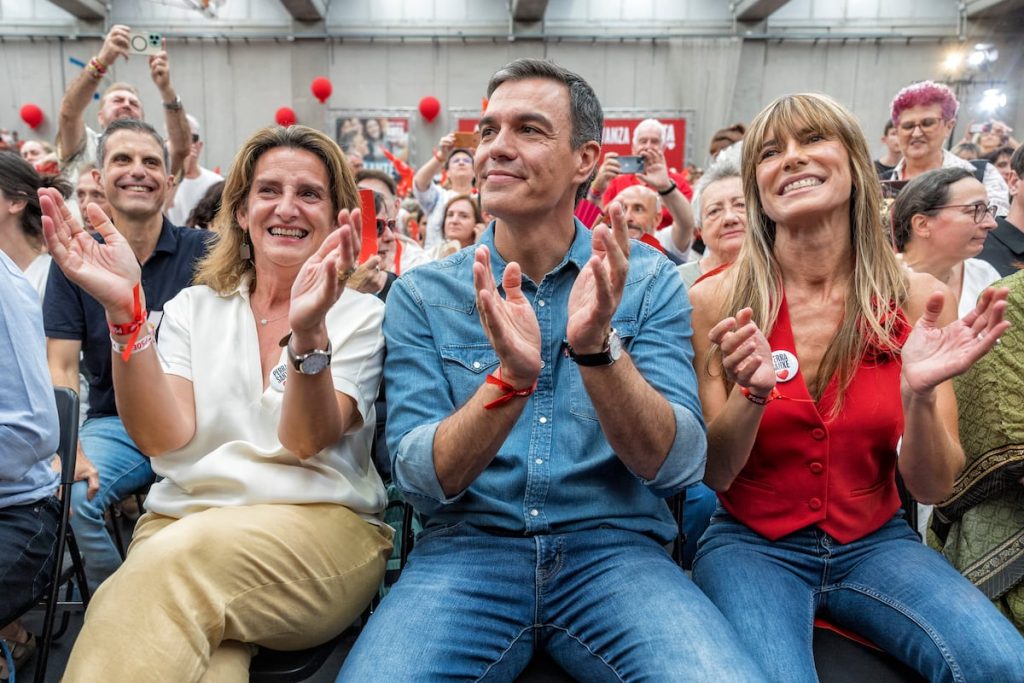Pedro Sánchez will remain in La Moncloa, but nothing will ever be the same in the PSOE. The word “relief” is the most used throughout the party’s organizational structure, from the top to the grassroots members, and summarizes the tension accumulated during five days in which all of socialism saw the resignation of the Prime Minister as the most probable outcome. The reaction to Sánchez’s continuity has been varied, from tears of joy at Ferraz to shouts of euphoria at La Moncloa (heard during the president’s speech) and the uncorking of bottles at ministries in impromptu celebrations. Former President José Luis Rodríguez Zapatero expressed his satisfaction, saying, “I expected this from the Prime Minister, he made the right decision.” Patxi López, spokesperson in Congress, shared, “Today democracy wins. Today we, the vast majority, win.” Emiliano García-Page, President of Castilla-La Mancha, valued the situation, saying, “I celebrate the personal reflection of the Prime Minister concluding that he and his family can handle the lies that may come their way.”
However, the week of drama, with Sánchez holed up in La Moncloa and the PSOE in suspense, also has its downside. Different socialist leaders consulted by this newspaper privately express their perplexity and incomprehension with the crisis management. Some consider “an error” the formula chosen by the Prime Minister to communicate that he was taking a few days for reflection. The lack of information left most of the party’s organic leaders out of the loop, with territorial leaders calling each other to see if anyone knew of any updates. Some party leaders were disappointed with Sánchez’s statement to move forward “with even greater strength if possible,” which they expected to be accompanied by a vote of confidence or more concrete plans for the promised “regeneration” campaign against misinformation and the degradation of public life.
It remains to be seen what the real consequences will be within the internal life of the PSOE. A veteran, experienced in many organizational battles, does not believe that the discomfort of these days will shake the PSOE: “There won’t be any movement inside. No one is in a position to say anything, and the members have spoken clearly. The president has shaken up the political scene, putting the membership in motion and mobilizing the left.” A former regional president with significant historical power in the PSOE expresses a similar opinion: “Sánchez emerges strengthened within the party, at least for the moment. It will be the upcoming elections, in Catalonia and Europe, that will tell us how the rest of the legislature unfolds more than what has happened.”
The PSOE retains the government, its number one priority, and does so by avoiding the earthquake of unforeseeable consequences that would have come with Sánchez’s sudden exit from office, without a replacement plan even outlined within the party. The resignation of the socialist leader as a possible option led to discussions about succession, although the priority was to prevent his resignation. The most natural option at first, in case of the government being in caretaker mode, was María Jesús Montero, the vice president and number two in the party, but other alternatives such as Pilar Alegría, the government spokesperson and Minister of Education and Sports, were also considered. This scenario is now postponed, but the question is until when.
Following these exceptional days, the PSOE resumes its organizational life. The federal commission of lists, which was supposed to meet last Friday, will now convene on Tuesday afternoon. Initially planned to be a videoconference, its members received a message on Monday morning indicating it would be an in-person meeting, with the possibility of remote attendance. This sudden change in the hours before the President’s appearance in La Moncloa was interpreted by some as a sign that Sánchez would remain in charge of the government: “If not, they wouldn’t have gone ahead with it.” All PSOE federations hope to be represented on the list in the top positions, as revalidating the 21 deputies from 2019 seemed impossible. At least until Sánchez once again surprised Spain and, of course, the PSOE.


